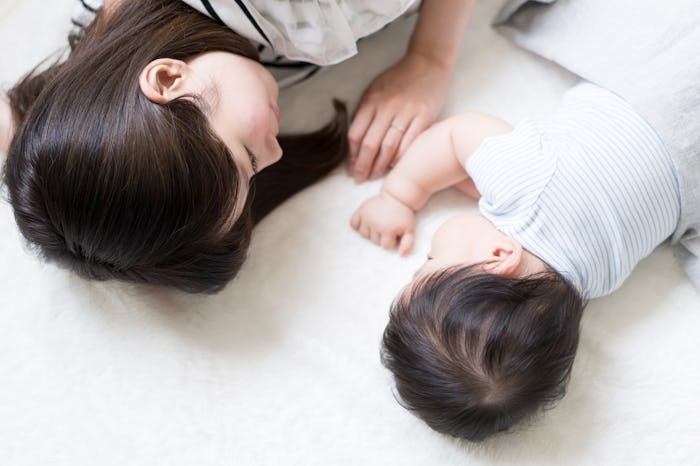Life

Here’s The Deal With Sids & Bed-Sharing
If you're a new parent, Sudden Infant Death Syndrome (SIDS) is likely high on your list of fears. Because little is known about the definitive causes of SIDS, it's common for SIDS to be a constant worry until your baby turns 1 and the risk reduces. So, if you're contemplating your future sleeping arrangements and asking yourself, "Can SIDS occur when you bed-share?" know that you're not alone in your worry, and there a few things you should know before you put your family sleeping plans into action.
As a new parent, it's not uncommon to become inundated with SIDS horror stories. For example, mine is a story I heard about a friend of a friend whose newborn died of SIDS while sleeping on her chest. Before you allow such stories to weigh in on your sleep decision making, though, it's best to read up on what SIDS is and when it typically occurs. According to the Mayo Clinic, SIDS is the sudden, unexplained death of an infant related to sleep. While the root cause of SIDS is unknown, The Mayo Clinic cites that scientists believe it is related to an abnormality in the brain that causes arousal from sleep. In the absence of a definitive cause, scientists have focused on the practices that seem to limit or lower the risk of SIDS.
In order to reduce the risk of SIDS, The National Institute of Child Health and Human Development recommends placing your baby on their back to sleep on a firm surface. You'll also want to remove any loose blankets or material that could cause suffocation if your baby isn't able to get it away from their face, which is why the same institute recommends close-fitting pajamas that can't ride up over your baby's face.
In guidelines released in October of 2016, the American Academy of Pediatrics (APA) recommended that babies share the same room as their parents until they are at least 6 months old, and ideally until they are 1 year old. However, they did specifically address the common practice of bed-sharing, acknowledging that it is something many parents choose to do. They do, however, maintain that babies should not share the same sleeping surface as their parents, citing that the risk of SIDS is increased for babies less than 3 months when they bed-share.
Other parenting experts, however, like pediatrician Dr. Sears, extoll the virtues of co-sleeping and claim that co-sleeping actually reduces the risk of SIDS by helping your baby arouse themselves from sleep better. Dr. Sears also cites the fact that in many countries with the lowest SIDS rates, bed-sharing and other forms of co-sleeping is the common practice.
Dr. Sears does recommend, however, that parents make sure to practice safe bed-sharing practices, including sleeping in a king size bed if possible and in order to ensure everyone has enough space, and making sure there isn't space between the mattress and the headboard for the baby to slide into.
The APA, however, won't get on board with those co-sleeping recommendations, so while they acknowledge that bed-sharing and co-sleeping do happen, they still reinforce that babies should have their own space to sleep, in order to keep SIDS risks down.